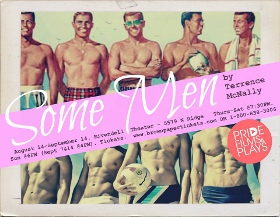THE GREAT GAY IMPROVISERS
You could call it an action meditation on marriage. As if to sum up his own theatrical legacy, as well as 70 years of gay life and love, Terrence McNally’s valedictory drama Some Men is a collage that merrily defies chronology. The reason: To prevent us from confusing the challenges of change with the inevitability of progress. In 135 minutes, this play (which premiered Off-Broadway in 2007) delivers a scatter-shot assemblage of snapshot vignettes stretching from a mogul-chauffeur’s commercial romance in 1922 to a bona fide gay marriage in 2014. If you don’t see yourself or friends in one scene, there are 14 more to generate that shock of recognition.
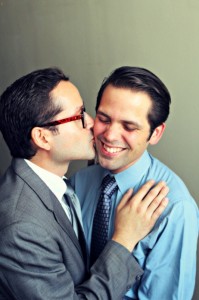 Deftly directed by David Zak and Derek Van Barham, Pride Films and Plays’ spirited Chicago premiere keeps it urgent (sometimes at the cost of plausibility) and real, the perfect complement to McNally’s all-defining dialogue.
Deftly directed by David Zak and Derek Van Barham, Pride Films and Plays’ spirited Chicago premiere keeps it urgent (sometimes at the cost of plausibility) and real, the perfect complement to McNally’s all-defining dialogue.
Chronicling how a subculture gets shaped by history and settings (Harlem, St. Vincent’s, the Waldorf-Astoria Hotel, the Internet, a bathhouse) is no simple task. But McNally has been doing it well for several decades (Love! Valour! Compassion!, Kiss of the Spider Woman, The Lisbon Traviata, Lips Together, Teeth Apart, Corpus Christi). Almost a highlight reel from these excellent period pieces, Some Men is, as its alternately dismissive and self-denigrating title implies, a Valentine to a score of often deliberately anonymous gay “improvisers.” Their secret struggles before 1969 and their public ones afterwards against AIDS, homophobia, and self-hatred put them on a map that changes every year. The result—a whole that’s definitely greater than its parts—follows key couples whose ins and outs, tos and fros, confessions and denials stand in for a lot more lovers.
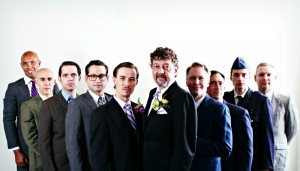 Any synopsis must refuse any straightforward (so to speak) timeline, just as McNally’s mixed bag of blasts from the past dares to do.
Any synopsis must refuse any straightforward (so to speak) timeline, just as McNally’s mixed bag of blasts from the past dares to do.
It begins and ends with a gay wedding where the guests’ internal monologues give them away much like the Grover’s Corners attendees in Our Town (the non-gay version of this play). In between are moments that evoke both memories and milestones: In 2007, the father of a gay soldier (former judge Tom Chiola) who perished in Kirkuk instinctively recognizes his son’s lover (Sam Burton-Harrison) as a worthy mourner. In 2004, gay dating has hit the Internet, with a literal manipulation as calculating as a Jane Austen country ball: Jude Hansen plays a snooty little cutie who dumps men at the drop of a click.
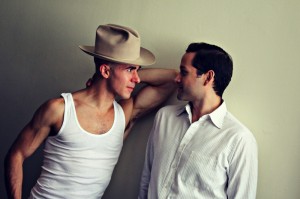 Other scenes depict Angel Eyes (Jeremy Sonkin), a mannered black chanteuse in 1932 Harlem, who, accompanied by piano-playing Mr. Keys (Robert Ayres), details his romance with an unnamed Lorenz Hart; the ebb and flow of casual sex and anonymous promiscuity at a 1975 bathhouse a la The Ritz; a 1989 hospital scene where the entire ensemble searingly recalls every possible reaction to the scary death of a young man with AIDS; and a purchased passion a la Downton Abbey that in 1922 blossoms into trust between a rich Jewish entrepreneur (Ben Burke) and his class-conscious Irish chauffeur (Nelson Rodriguez). 83 years later, that same seaside setting is visited by three fashionable couples—including a gay father and son with their respective partners—who wonder about the gay lovers who preceded them by four generations.
Other scenes depict Angel Eyes (Jeremy Sonkin), a mannered black chanteuse in 1932 Harlem, who, accompanied by piano-playing Mr. Keys (Robert Ayres), details his romance with an unnamed Lorenz Hart; the ebb and flow of casual sex and anonymous promiscuity at a 1975 bathhouse a la The Ritz; a 1989 hospital scene where the entire ensemble searingly recalls every possible reaction to the scary death of a young man with AIDS; and a purchased passion a la Downton Abbey that in 1922 blossoms into trust between a rich Jewish entrepreneur (Ben Burke) and his class-conscious Irish chauffeur (Nelson Rodriguez). 83 years later, that same seaside setting is visited by three fashionable couples—including a gay father and son with their respective partners—who wonder about the gay lovers who preceded them by four generations.
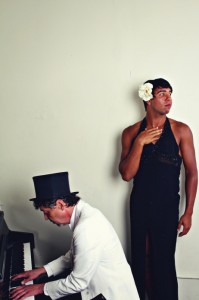 McNally also conveys the psychology behind politics: Two closet cases at the New York Athletic Club (Patrick Rybarczyk and Edward Fraim) engage in an elaborately nasty argument over whether either should dare to come out and “out” the other. In an achingly antagonistic scene that says a ton about how to make history happen, a drag queen (David Besky), caught in the Stonewall melee, denounces the cowardly queens who refuse to fight for their rights. An interview conducted by two young gay researchers (Sonkin and Button-Harrison) of two of the play’s veterans (Chiola and Rybarczyk) devolves into rancor over a major misunderstanding: how to measure the courage required to (incrementally) change the world. In the most generic (and stiltedly performed) offering—a group-therapy session from today—assorted gay men avoid empty affirmations in order to pick at each other’s philanderings and hypocrisy. Happily, this tussle is immediately followed by the Waldorf wedding that retroactively makes sense of Some Men and their literal dates with destiny.
McNally also conveys the psychology behind politics: Two closet cases at the New York Athletic Club (Patrick Rybarczyk and Edward Fraim) engage in an elaborately nasty argument over whether either should dare to come out and “out” the other. In an achingly antagonistic scene that says a ton about how to make history happen, a drag queen (David Besky), caught in the Stonewall melee, denounces the cowardly queens who refuse to fight for their rights. An interview conducted by two young gay researchers (Sonkin and Button-Harrison) of two of the play’s veterans (Chiola and Rybarczyk) devolves into rancor over a major misunderstanding: how to measure the courage required to (incrementally) change the world. In the most generic (and stiltedly performed) offering—a group-therapy session from today—assorted gay men avoid empty affirmations in order to pick at each other’s philanderings and hypocrisy. Happily, this tussle is immediately followed by the Waldorf wedding that retroactively makes sense of Some Men and their literal dates with destiny.
Tianyu Qui’s playful set design keeps this “living newspaper” fluid and fun. Best of all, the Pride ensemble make their deadly sin a joy as much as a job.
photos by Alexa Ray Meyers
Some Men
Pride Films and Plays
Rivendell Theatre, 5779 North Ridge
Thurs-Sat at 7:30; select Sundays at 4:00 and 6:00
Wed, Sep 10 only, at 7:30
scheduled to end on September 13, 2014
for tickets, call 800.838.3006 or visit www.brownpapertickets.com
for more info, visit www.pridefilmsandplays.com
